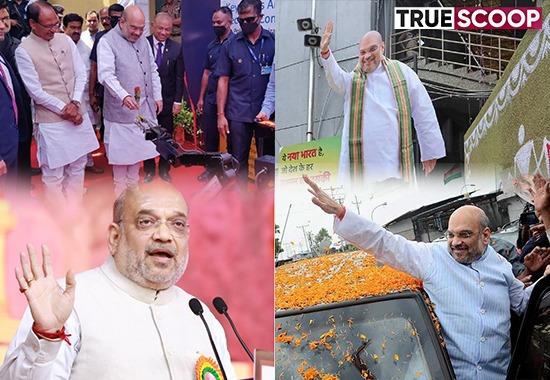The Common Civil Code may soon be implemented in the country. Union Home Minister Amit Shah gave these pointers on his visit to Bhopal on Friday.
He held a meeting with the core committee at the party office of the BJP. In the meeting, Shah said – that issues like CAA, Ram Mandir, Article 370 and triple talaq have been decided. Now it is the turn of the Common Civil Code.
He also informed that the Common Civil Code is being implemented in Uttarakhand as a pilot project. The draft is being prepared. Whatever is left, everything will be fine. You guys don't do any such thing which will harm the party.
Union Minister Amit Shah with CM Shivraj Singh Chouhan, State BJP President VD Sharma and other leaders in the BJP office.
Earlier, he asked the senior leaders of the state whether all was well in the country? After this, he discussed the issue of the Common Civil Code. Shah also revealed that before the next elections, Rahul Gandhi will become the President of the Congress, but there is no need to worry about it. Now Congress will go further down. There is no challenge.
State President VD Sharma, Chief Minister Shivraj Singh Chouhan along with all the big leaders were present at this meeting. Shah returned to Delhi by a Border Security Force (BSF) aircraft. Jyotiraditya Scindia and MP Rakesh Singh also accompanied him.
With its implementation, social issues like marriage, divorce, succession, and adoption will come under common law in the country. There will be no court or separate system based on religion.
Article 44 of the constitution gives the power to make it. It can be implemented only by the Central Government through Parliament.
A separate meeting in the state president's room
Before the meeting with all the big leaders, ministers, and MLAs in the party, Shah held the chief minister, state in-charge Murlidhar Rao, Pankaja Munde, Hitanand Sharma, Kailash Vijayvargiya, Jyotiraditya Scindia, in the room of state president VD Sharma. Spoke on important issues with Prahlad Patel etc.
Before independence, separate laws were implemented for Hindus and Muslims. Women were the first to stand up against it. The BJP included it in its three main issues. The issue was also included in the manifesto of the 2014 Lok Sabha elections.
Shah gave an example by linking Bengal where a leader said that they work very hard for the organization. Every day at noon they go to the MP's house to take 100 rupees of the surrender fund, but they do not meet.
While it should be that if they reach their house at 7 in the morning, they will get the money. This is the difference between hard work and hard work.
When the state president of Odisha was told about the strength of the booth as the national president, people used to laugh behind their backs. He said that the president is paramount in the organization. Even if he is small in age. I too became president at a young age.
Casteism is now the reality of the country. Therefore, by doing calculations according to this, the leader of every caste will have to be given a position and importance.
BJP lost in the assembly elections, but the vote percentage was high. Mistakes were made, which were reviewed. Now public opinion is increasing due to the efforts of the Chief Minister.
The role of the organization in this exercise is essential. Elections are not won by the work of governments alone. The strength of the organization will win the election.
In Delhi, the distance of big leaders from the workers have increased. Respect has decreased. There was a lack of discipline. This situation should not happen in Madhya Pradesh. Examples are Madhya Pradesh, Uttar Pradesh, Gujarat, Chhattisgarh and Rajasthan in terms of organization.
The number of people in the meeting is the beneficiary of power. Then looking at the CM, he said that these are the biggest beneficiaries. Now they need to go to the booths. Every leader should aim for a strength of 10 booths.
